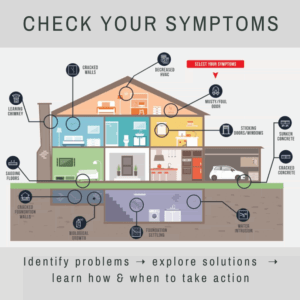The Reasons You Need Downspout Extensions For Your Home
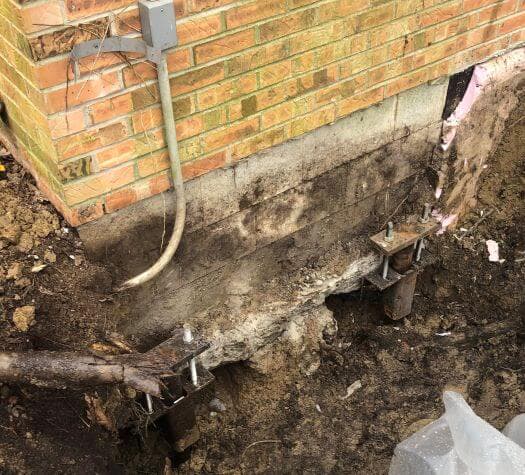
Originally posted 6/4/20, updated 12/15/22
Last summer, a heavy thunderstorm unleashed a large number of pine needles onto my roof. These needles washed off the roof, slid around in the guttering, then lodged themselves into one corner. For the rest of the night, the heavy rain washed along the gutter, hit the pine needle dam, and spilled over the gutter into my recently-planted flower bed.
The next morning, I had a watery mess to deal with: mud splatter, standing water, mulch washed out into the yard… It took one night for a malfunctioning gutter to damage my landscape. Can you imagine what that corner would look like, if I left the gutter clogged for months?
At Acculevel, we see poorly chosen downspout locations and blocked gutters cause significant damage to homes every year. We’ve been waterproofing homes, extending downspouts, and repairing foundations since 1996.
Downspout extensions are a preventative measure that can save a homeowner thousands of dollars in future repairs. In this blog, I’ll explain the ripple effect that poor guttering can have on your home, and how well-placed downspouts protect your home.
Why Downspout Location Matters
During a thunderstorm, your gutter works like a funnel. It collects water from the wide surface of your roof and channels it into narrow downspouts.
The water builds up momentum as it runs down your gutters, exiting the downspout with a fair amount of force. If your downspout extensions don’t carry it a safe distance from your house, they’re depositing a large concentration of water directly around your foundation.
This is NOT something you want.
When water is deposited close to your home, it is in the best place to make trouble for you. It works something like this:
- Water draining too close to a concrete slab erodes the dirt under the concrete slabs around your home, making them sink. When I say “slab,” I’m talking about your driveway, patios, porches, and walkways.
- Once a slab is sinking, it’s no longer properly graded. This means it can collect water and direct it towards your home, rather than away from it.
- Water collecting around your house will build up and exert hydrostatic pressure against your foundation. Hydrostatic pressure is the force of the water trying to move through your foundation. Need to know more? We have a blog that explores hydrostatic pressure here.
- Hydrostatic pressure creates cracks in your foundation. These cracks let water enter your basement or crawl space.
- Over time, this water will saturate the soil. This causes the ground to soften, which can allow your foundation to settle (“sink”).
- Mold begins to form, and your foundation starts to decay and shift.
All of this boils down to a simple fact: downspouts have a powerful and potentially negative impact on your home.
The first picture was taken by an Acculevel project advisor during a routine estimate appointment. You can see the downspout is directly next to the house. Water has been collecting around this corner, creating a considerable slope in the ground. The cracks in the brick indicate the foundation has settled.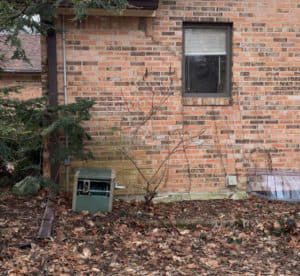
The next two pictures were taken by Acculevel crew members, during and after repairs. In the second photo, the ground next to the house has been excavated. Two helical piers have been installed to stabilize the foundation.
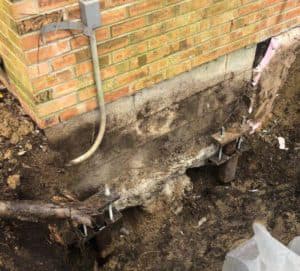
In this last picture, the downspout extension has been installed and buried, the stair-step cracks in the foundation are repaired, and the excavated area is refilled.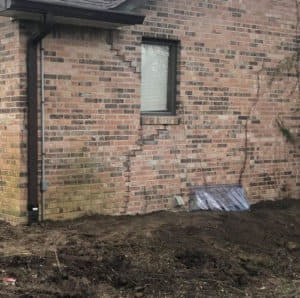
How Do You Extend Downspouts?
Extensions should be attached to your existing downspouts and then routed away from your house. We recommend that downspouts drain at a minimum of 10 feet from your foundation. If at all possible, incorporate your yard’s natural grading to improve the drainage flow, and to help move the water farther from your home.
Once the extensions are in place, they can be buried in the yard. They don’t need to be buried deeply; 5-6 inches below the surface is sufficient. This is something it’s possible to tackle as a DIY project, if you’re so inclined. We have a tutorial that you can view below:
If you don’t want to do this project on your own, you can hire a contractor. At Acculevel, the cost to extend a downspout is approximately $330 per 10-foot extension (if the total home repair cost is at least $1,000).
Depending on your property and its grading, you may want more than 10 feet (20 feet is optimal if your property allows for it). Extensions past the initial 10-foot mark are an additional $25 per foot.
What if Downspouts Have Already Damaged My Home?
Depending on the type of damage the water has done, you may need different repair services. We have a detailed guide to foundation problems, here. You should do a thorough inspection of your home to determine what issues you may have. We recommend that homeowners review their homes at least once (twice is optimal) per year.
Acculevel offers membership to our Home Inspection Program, the cost is $500 for 5 years. You are also welcome to use our free DIY Home Inspection Checklist for your Foundation.
If you don’t find any significant problems, that’s great! But if you do find signs of damage, you should look them up on our Symptom Checker:
This will explain the potential ramifications of the symptoms you find, and help you decide what actions you need to take and when.
Does Your Home Need Repairs?
You should find an experienced foundation company, and make an appointment. Before you sign a contract for any service, we urge you to always verify the company is reputable, insured, and accredited by the Better Business Bureau.
Not sure how to hire a contractor or the right questions to ask? Please use our Detailed Guide with Checklist. The article gives you some insight into why you should ask these questions and provides Acculevel’s answers. You can also download a blank checklist of the questions to fill out with any contractor you interview.
If you live in Indiana or the surrounding states, contact Acculevel. If you have noticed any problems and would like an evaluation, you can request a free estimate. An experienced project advisor will examine the areas of concern and recommend the best course of action for you, to keep your home strong and healthy for years to come.

